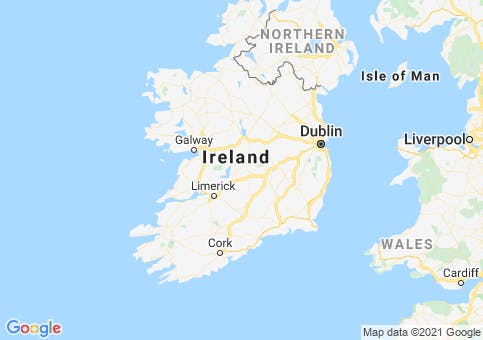The monthly cost of living in Ireland will very much depend on your personal needs, the lifestyle you choose, and where in the country you decide to settle.
Accommodation, groceries, utilities, transport and healthcare are all items that will obviously need to be budgeted for.
Accommodation
At the end of March 2015, Dublin was the most expensive place to live, with rents in most parts of the capital exceeding €1,000 (US$1,130) a month for a two-bedroom property. The average for a similar property in Cork city is now around €910. (US$1,028)
If you look to smaller towns and rural areas you'll find rents are usually much lower. Average monthly rent for a two-bedroom property in County Leitrim is €426 (US$481). In County Longford it’s €477 (US$539) and in Donegal €509. (US$575)
The price of groceries varies widely, depending on which supermarket you choose to do the bulk of your shopping in. German chain stores like Lidl and Aldi are now well-established in Ireland and offer quality products at discount prices. Irish and British grocery stores like Dunnes Stores, Tesco, and Supervalu tend to be a little more costly, but they do have regular special offers on various items.
Get Your Free Report on the World's Best Places to Retire in 2025
Get Your Free Report on the World's Best Places to Retire in 2025
Simply enter your email address below to sign up for our free daily postcard e-letter and we'll also send you a FREE report on The World's Top 10 Retirement Havens for 2025.

By submitting your email address, you will receive a free subscription to IL Postcards and special offers from International Living and our affiliates. You can unsubscribe at any time, and we encourage you to read more about our Privacy Policy.
Here is a sample grocery basket from a Tesco supermarket (prices in U.S. dollars):
| Item | U.S. $ |
| Bananas | $1.41 per kilo |
| Apples | $2.52 per kilo |
| Pears | $2.14 per kilo |
| Oranges | $2.14 per kilo |
| Milk | $0.85 per litre |
| Eggs (small) | $2.25 per dozen |
| Potatoes | $0.55 per kilo |
| Onions | $0.78 per kilo |
| Tomatoes | $1.13 per kilo |
| Chicken (whole) | $3.50 per kilo |
| Best Steak | $42.32 per kilo |
| Pork Chops | $6.52 per kilo |
| Bread Baguette | $0.85 |
| American Sandwich Bread (600 grams) | $0.78 |
| Fish (Cod fillet) | $13.52 per kilo |
| Salmon | $17.66 per kilo |
| Mineral Water (sparkling) | $0.45 per liter |
| Coca Cola (2 litres) | $2.59 per liter |
Utilities
Electricity is available from a number of suppliers throughout Ireland. Natural gas is also available, but you are unlikely to have a supply in small towns and rural areas.
The average annual cost of electricity for a two-bedroom property is €987 (US$1,115) If it is available in your chosen location, natural gas for a two-bedroom property averages €740 (US$836) per year.
Transportation
Outside of areas with sizeable populations, local public transport is almost non-existent unless you live beside a main road that is on a bus route. It is something to keep in mind if you do not drive and choose to live in a rural location.
The national bus company (Bus Éireann) operates good services in a number of cities. The monthly bus pass for Dublin is €132.50, for Cork €97.50, Galway €69.50, Limerick €69.50 and Waterford €62.50
Bus Éireann also operate a limited number of routes in the towns of Athlone (2), Balbriggan (1), Drogheda (2), Dundalk (1), Navan (1) and Sligo (5).
Cost of running a car
The Irish Automobile Association recently estimated the annual cost of running a medium sized car at just under €1,000 per month. That figure included a high annual mileage and depreciation of the vehicles value, something most people don’t consider.
A great deal will depend on the type of car you buy, how often you use it and how many miles you travel.
You should allow around €250 per month for a small/medium sized used car. This should cover insurance, road tax, maintenance, annual road test and fuel for around 10,000 Kilometers per year.
Petrol, or gas, currently costs around €1.44 (US$1.63) per liter.
Health Insurance
Residents who are not citizens of another EU country will not be entitled to reciprocal public healthcare. Unless your own health insurance covers you, it will be necessary to take out private health insurance in Ireland.
Basic annual cover starts from as little as €394.
In Ireland, individuals pay the same premium for a particular health insurance plan, irrespective of age, gender and the current/future state of their health. This is known as community rating.
New laws came into force on 1st May 2015, that introduced Lifetime Community Rating. The new law has modified community rating to reflect the age at which a person takes out private health insurance. Now, if you are aged 35 or over, a percentage loading will be applied to the premium.
The loading is easily calculated. At age 35 you will pay an additional 2% on top of your premium. Every year that you are older than that, it will incur a further 2% up to a maximum of 70%.
As an example: A basic health plan with a premium of €394, would cost a new policy purchaser aged 55 an additional 40%.
*Using an exchange rate of 1€ = US$1.13
Get Your Free Report on the World's Best Places to Retire in 2025
Get Your Free Report on the World's Best Places to Retire in 2025
Simply enter your email address below to sign up for our free daily postcard e-letter and we'll also send you a FREE report on The World's Top 10 Retirement Havens for 2025.

By submitting your email address, you will receive a free subscription to IL Postcards and special offers from International Living and our affiliates. You can unsubscribe at any time, and we encourage you to read more about our Privacy Policy.










